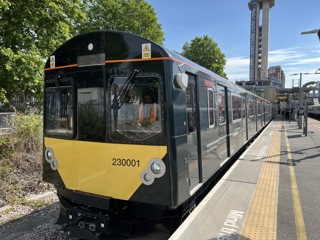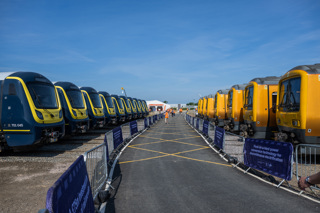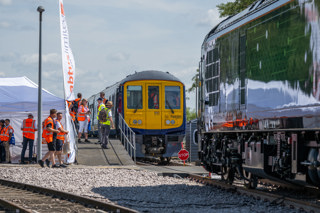For the second time this decade, we have had three Transport Secretaries in a year, emphasising how this is a post that while relating to a long-term industry, suffers from short-term tenures of ministers.
In 2022, it was because of the insane Truss interregnum, when Anne-Marie Trevelyan held the post for just seven weeks.
For the second time this decade, we have had three Transport Secretaries in a year, emphasising how this is a post that while relating to a long-term industry, suffers from short-term tenures of ministers.
In 2022, it was because of the insane Truss interregnum, when Anne-Marie Trevelyan held the post for just seven weeks.
In 2024, it was because we had a General Election, while a very minor and rather odd scandal did for Louise Haigh.
Before looking at the record of the Labour government since last July’s election, it is worth recalling what happened in the dying days of the Conservative administration, lest we forget how badly the railways were treated by Rishi Sunak’s government
Indeed, the final actions of the flailing and failing Tory government provided a neat summary of its attitude to the rail industry.
Having identified the fundamental problem of the dysfunctional relationship between Network Rail and the franchises, when the system buckled under the May 2018 timetable changes, the Conservatives rightly began to consider ways of restructuring the railways.
A review, under former aviation executive Keith Williams, was quickly launched. But it did not actually emerge until three years later, with Transport Secretary Grant Shapps having added his name to the final report.
But then Shapps moved on to higher things when Boris Johnson was forced out, and the report gathered dust - although at great expense as a huge team of consultants was gathered to create the Great British Railways Transition Team (GBRTT). With the excuse of COVID, the wheels of Whitehall ground particularly slowly, even though the pandemic had ended.
The report’s recommendation to set up a new body (Great British Railways) seemed to have been accepted, and the transition team was supposed to bring it about.
But disputes within the Conservative party, with many MPs sceptical about what they saw as renationalisation and concerned over precisely how much power it should have, meant that progress was stalled.
Nevertheless, the spending went on, with GBRTT racking up costs annually of tens of millions of pounds - mostly on consultants at eye-watering day rates.
In truth, neither Prime Minister Rishi Sunak, who entered No. 10 in October 2022, nor his Transport Secretary Mark Harper had any enthusiasm to continue the reform process.
Despite the fact that there would have been plenty of time to enact new legislation in the final Parliament of the Conservative government, Harper merely announced that there would be a draft bill for reforming the railways, but no actual legislation.
Already, the farcical way that the section of HS2 between Birmingham and Manchester had been scrapped by Sunak, in a supposedly crowd-pleasing speech to the Party conference, suggested that railways were not a priority for his administration.
That was encapsulated by the fact that on the very day that the House of Commons Transport Select Committee was supposed to produce its report on the draft bill, Sunak knocked on the door of Buckingham Palace to throw in the towel to his dying administration.
Now we are in a totally different world, but still a confusing one. That’s because it is unclear exactly how seriously the new government regards the future of the railways.
On the one hand, there has been a remarkably speedy introduction of legislation. This is not only a tribute to the now-departed Louise Haigh for getting a controversial bill passed through so quickly (albeit helped by a ridiculous large Parliamentary majority), but also a clear indication that there was support from the Cabinet and No. 10.
Rail ‘renationalisation’ is perceived by senior Labour ministers as an important expression of how the government can ‘change’ things - which was the key election slogan.
Taking the franchises back in-house is a visible expression of how Labour is different from its Tory predecessors. As one railway watcher put it to me: “It almost seemed like this was emergency legislation brought in during wartime.”
So, it’s all systems go for the Labour reforms.
But is it really? Taking back the franchises is the easy bit. What comes next?
For that, we need the second piece of legislation, which will create Great British Railways along with a new structure for the industry.
I accept that we could hardly expect an ‘oven-ready’ plan, but there seems a total absence of urgency about this next step.
Moreover, where are the speeches from Labour’s top team, Sir Keir Starmer and Rachel Reeves, about how the railways will be transformed and how important they are to our economy.
I’m not sure that either of them has ever given more than a cursory mention to the railways, and yet ‘renationalisation’ has been a key part of the agenda. It all seems a bit contradictory to me.
If this return to a British Rail-type structure (even though we know that much of the old BR cannot be reclaimed) is deemed to be so important that legislation was rushed through to bring it about, what is it going to achieve? How are the railways going to be improved and how will that be measured. All that remains unknown.
I thought it incumbent to end this review of the year on a positive note, given all the negativity in the industry at the moment about poor performance, the loss of the commuter base in the post-COVID world, and the uncertainty over investment generally and on HS2 in particular.
So, two bits of good news. Firstly, the success of the Elizabeth line, despite the patchy performance, is a remarkable tribute to the ‘build it and they will come’ line of thinking.
The pity is that there is no Crossrail 2 in the offing any time soon, despite the fact that it would have an enormous regenerative effect on a swathe of London, and that the route has been safeguarded.
The second bit of cheer is the reopening of the Northumberland Line to passenger services, a tribute to the campaigning skills of the local group SENRUG (South East Northumberland Rail User Group), without whose efforts this would never have happened.
It is, though, dispiriting that it cost nearly £300 million to reopen 19 miles of an existing freight line. That is something which Labour ministers should look at in 2025 - ensuring that bringing back railway lines is not prohibitively expensive.
Login to continue reading
Or register with RAIL to keep up-to-date with the latest news, insight and opinion.



















Login to comment
Comments
No comments have been made yet.